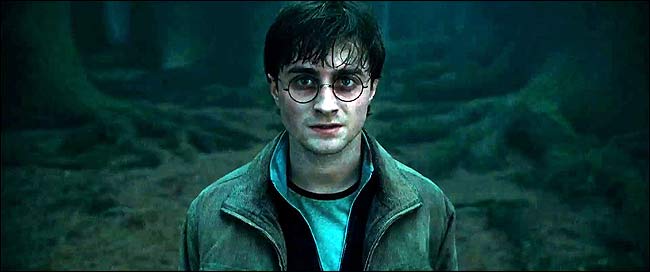

Long Live Hogwarts
A fitting farewell for Harry Potter
by Molly Templeton
HARRY POTTER AND THE DEATHLY HALLOWS PART 2: Directed by David Yates. Screenplay by Steve Kloves, based on the novel by J.K. Rowling. Cinematography, Eduardo Serra. Music, Alexandre Desplat. Editor, Mark Day. Starring Daniel Radcliffe, Emma Watson, Rupert Grint, Alan Rickman, Ralph Fiennes, Matthew Lewis and Evanna Lynch. Warner Bros. Pictures, 2011. PG-13. 130 minutes. ![]()
“It all ends,” read the posters for Harry Potter and the Deathly Hallows Part 2. And end it does, if by “it” you mean only the series of films, an up-and-down adventure from the first moment we met a wide-eyed Harry (Daniel Radcliffe) to the last scene of Part 2s epilogue. Potter isnt over, and wont be; not only will new readers keep coming to the books, but fans will keep writing fan-fiction in which Harry and Draco have a torrid secret romance, and J.K. Rowling will keep teasing and pleasing her zillions of readers with things like Pottermore, the “exciting online experience around the reading of the Harry Potter books” that will be unveiled at the end of the month.
Harry Potter, the Boy Who Lived, will keep living, as immortal as a fictional character can be. How long until the films get remade? A decade? A new Potter boy, a new set of redheaded Weasleys? A certain sense of inevitable continuation hangs over Harry Potter and the Deathly Hallows Part 2, rendering it slightly anticlimactic. It all already ended once, in 2007, when owls in the form of letter carriers dropped heavy packages on doorsteps, each containing a specially packaged copy of the seventh Harry Potter book.
But that doesnt keep Deathly Hallows Part 2 from being its own satisfying, exceptional experience. Youll get no recap, no “Previously, on Harry Potter … ”; director David Yates, in his fourth well-earned Potter bow, has no time for that. From the seaside Shell Cottage, the film moves swiftly to Gringotts, where Helena Bonham Carter does a pitch-perfect Emma-Watson-as-Hermione impression; to dark, unwelcoming Hogsmeade, where Aberforth Dumbledore (Ciaran Hinds) has a truncated but vital part to play; and finally to Hogwarts, where Neville Longbottom (Matthew Lewis), the boy who was almost the storys hero, leads the bruised and tattered remnants of Dumbledores Army. Hogwarts, muted and gloomy, looms like a ghost of its once bright and welcoming self. In the shadow of war, somber students march under the cold eye of headmaster Severus Snape (Alan Rickman).
Snape is as key to the events of Deathly Hallows as young Mr. Potter himself, and Rickman, as ever, utterly owns his part. (If you can read the Potter books without hearing Snapes dialogue in Rickmans dry, precise tones, you are made of stronger imaginative stuff than I.) Oddly, though the story wraps its complicated threads around the central trio (while giving Hermione little to do but comment on the brilliance of Rons every idea), the grown-ups get many of the memorable scenes: Molly Weasley (Julie Walters) hollering her battle cry; Minerva McGonagall (Maggie Smith) wordlessly banishing a man from Hogwarts; Narcissa Malfoy (Helen McCrory) making a choice that seals so many fates. Hers isnt the only key choice, but its a quiet and vital moment that, as is so often the case in Rowlings world, hinges on the decisions we make out of love.
Rowling can be a bit heavy-handed with her theme, but Yates and screenwriter Steve Kloves have a lighter approach to the power-of-love aspect of her tale. Whats most striking in this final film is less the emotional wallop than the gorgeous, convincing world in which the wizards great battle takes place. From the caverns of Gringotts to the towers of Hogwarts, the locations feel entirely real. Stone warriors clunk heavily to the ground; dragons wings look solid enough to run your hand over; a barrage of spells fills the sky like so much more than a wall of twinkling lights.
By grounding a dizzying battle in precise, believable effects and a solid sense of where everyone is at any given moment, Yates and his team give the film a respectable amount of heft to go along with its heart. They cant do much about Rowlings sentimental epilogue, but somehow, the passing of the Potter torch is slightly less cloying on screen (apart from the poor aging-up of the relevant characters). Its a reminder that theres always another generation coming along, reaching for books, listening to stories, ready to set foot on Platform 9 3/4 and wait for that splendid train to whisk them off to Hogwarts. And Hogwarts, on page or screen, will always be there.